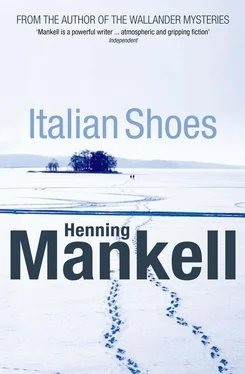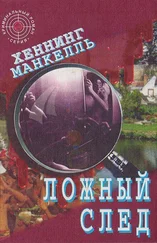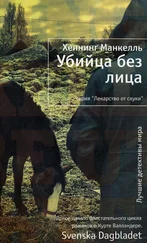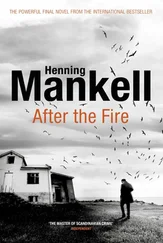It had been a tough day. We were both tired. We had dinner in silence. Louise retired to her caravan for the night. I searched around in the bathroom cupboard and found a sleeping pill. I fell asleep almost immediately, and slept for nine hours. I couldn’t remember when that had last happened.
Louise was sitting at the kitchen table when I came downstairs the next morning.
‘I’m off,’ she said. ‘Today. The sea’s calm. Can you take me to the harbour?’
I sat down at the table. I wasn’t at all prepared for her intention of leaving so soon.
‘Where are you going?’
‘I have several things to see to.’
‘But surely Harriet’s flat can wait for a few days?’
‘That’s not where I’m going. Do you remember the cave with the wall paintings that have been attacked by mould?’
‘I thought you were going to bombard politicians with letters about that?’
She shook her head.
‘Letters don’t do any good. I have to take some different action.’
‘What?’
‘I don’t know. Then I shall go and look at some Caravaggio paintings. I have money now. Harriet left nearly two hundred thousand kronor. She used to give me some money now and then. And I’ve always been thrifty anyway. No doubt you wondered about all the money you found when you went snooping around in my caravan. Thrift, nothing more. I haven’t only spent my life writing letters. I’ve occasionally had a paid job like everybody else. And I’ve never thrown money about.’
‘How long are you going to be away? If you’re not going to come back, I’d like you to take your caravan with you. This island is no place for it.’
‘Why do you get so angry?’
‘I’m sad about you clearing off like this, and I don’t think you’ll come back again.’
‘I’m not like you. I’ll be back. If you won’t allow my caravan to remain here, I suggest you burn that up as well. I’m going to pack now. I’ll be ready to leave in an hour. Are you going to take me, or aren’t you?’
It was dead calm, and the sea like a millpond, when I took her to the mainland. The outboard motor started coughing soon after we left the jetty, but then recovered and behaved normally for the rest of the trip. Louise sat smiling in the bows. I regretted my outburst.
A taxi was waiting in the harbour. All she had with her was a rucksack.
‘I’ll phone you,’ she said. ‘And send cards.’
‘How can I get in touch with you?’
‘You have my mobile number. I can’t promise it will be switched on all the time, though. But I promise to send a card to Andrea.’
‘Send one to Jansson as well. He’ll be thrilled to bits.’
She squatted down so as to be closer to me.
‘Keep my caravan neat and tidy until I get back. Clean it regularly. And keep brushing my red shoes — I’ve left them behind.’
She caressed my forehead then got into the taxi, which set off up the hill. I took my petrol can to the chandler’s to have it topped up. The harbour was almost deserted. All the summer boats had left.
When I got back home I took a walk round the island, looking for the cat again. But I didn’t find it. I was now more alone on the island than ever before.
Several weeks passed. Everything went back to the way it had been before. Jansson would arrive in his boat, occasionally bringing a letter from Agnes, but I didn’t hear a word from Louise. I phoned her several times, but there was never an answer. The messages I left became like short, breathless diary notes about the weather, the wind and the cat who remained missing.
Presumably the cat must have been taken by a fox, which must have swum away from the island.
I grew increasingly restless. I had the feeling that I wouldn’t be able to stick it out for much longer. I would have to leave. But I didn’t know where to go.
October arrived with a storm from the north-east. Still no word from Louise. Agnes had also stopped writing. I spent most of the time sitting at the kitchen table, staring out of the window. The landscape out there seemed to be becoming petrified. It felt as if my whole house was slowly being swallowed up by a gigantic anthill that grew silently higher and higher.
Autumn became harsher. I waited.
The first frost came in the early hours of 3 October.
I checked through my old logbooks and found that there had never been minus temperatures as early as this all the years I had lived on the island. I was still waiting to hear from Louise. I hadn’t even received a postcard from her.
That evening the telephone rang. A woman asked if I was Fredrik Welin. I thought I recognised both her dialect and her voice, but when she said her name was Anna Ledin, it said nothing to me.
‘I’m a police officer,’ she said. ‘We’ve met.’
Then the penny dropped. The woman lying dead on her kitchen floor. Anna Ledin was the young police officer with her hair in a ponytail under the cap of her uniform.
‘I’m ringing in connection with the dog,’ she said. ‘Sara Larsson’s spaniel. We couldn’t find anybody to adopt her, so I took her in. She’s a lovely dog. But unfortunately I’ve met a man who’s allergic to dogs, and I don’t want to have her put down. Then I thought about you. I had made a note of your name and address, and so I’m phoning to ask if you could possibly consider taking the dog on. You must be fond of animals, otherwise you wouldn’t have stopped as you did when you saw her by the roadside.’
I had no doubt when I replied.
‘My dog died just a few months ago. I can take on the spaniel. How will you get her here?’
‘I can bring her in my car. I discovered that Sara Larsson used to call her Ruby. Not exactly a common name for a dog, but I continued using it. She’s five years old.’
‘When would you come?’
‘At the end of next week.’
I didn’t dare to try and ferry the dog over in my own boat as it was so small. I made an arrangement with Jansson. He asked me all kinds of questions about what kind of dog it was, but all I told him was that I’d inherited it.
Anna Ledin arrived at the harbour with the dog at three in the afternoon on 12 October. She looked quite different when she wasn’t in uniform.
‘I live on an island,’ I said. ‘She’ll be the sole ruler.’
She gave me the lead. Ruby sat down beside me.
‘I’ll leave right away if you don’t mind,’ she said. ‘I’ll get upset if I don’t. Can I ring now and then to see how she’s getting on?’
‘Of course you can.’
She got back into her car and drove off. Ruby didn’t start pulling at the lead in an attempt to run after the car. Nor did she hesitate to jump down into Jansson’s boat.
We sailed back home through the dark waters of the bay. Cold winds were blowing up from the Gulf of Finland.
When we had landed and Jansson had left again, I let the dog loose. She disappeared among the rocks. Half an hour later she returned. Already the loneliness felt less oppressive.
It was now well and truly autumn.
I still wondered what was happening to me. And why I’d heard nothing from Louise.
I didn’t like the dog’s name.
It didn’t seem that she thought much of it either, as she seldom responded when I called her.
No dog can possibly be called Ruby. Why had Sara Larsson given her that name? One day, when Anna Ledin rang to ask about how the dog was doing, I asked her if she knew how the dog had acquired the name.
I was surprised by her answer.
‘Rumour has it that when she was a young woman, Sara Larsson had a job as a cleaner on a cargo ship that often visited Antwerp. She was paid off there and got a job as a cleaner in a diamond-cutting workshop. Maybe it was her memories of her time there that inspired her to give the dog that name.’
Читать дальше












